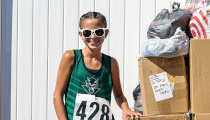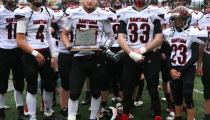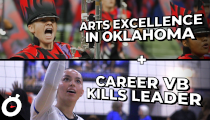Celebrating Completion of Fall Sports and Performing Arts, Winter Activities Outlook
By Dr. Karissa Niehoff on January 05, 2022 nfhs news Print
Before we report on the start of the winter high school sports and performing seasons, we want to celebrate the conclusion of fall activities across the country.
After a chaotic 2020 fall season scrambled by the pandemic in which only 30 states were able to hold state football and volleyball championships in the traditional settings, all states were involved in the successful comeback of high school sports and performing arts during the past two months.
California, Oregon and Nevada – three states that were unable to play football in the fall of 2020 – had successful returns, with the California Interscholastic Federation crowning 15 state champions in its various classes.
After playing a truncated six-game season in the spring without state championships, the Oregon School Activities Association returned to its regular offering of six state championships, with Central Catholic High School of Portland defending its 6A title.
In Nevada, a year after the coronavirus cancelled the fall 2020 season, the Nevada Interscholastic Activities Association returned in grand style with four of its five state championship games being contested at the new Allegiant Stadium in Las Vegas. Bishop Gorman of Las Vegas won the Class 5A title – its 11th championship victory in school history.
In girls volleyball, two states celebrated historic state championships ahead of this summer’s 50th anniversary of the passage of Title IX. The Nebraska School Activities Association, with state championships in six classes, and the Indiana High School Athletic Association, with four classes, each held their 50th state tournaments in November.
And fans returned in record numbers in many cases as well. In Texas, 45,769 fans were on hand at AT&T Stadium in Arlington to watch Dallas South Oak Cliff High School win the 5A-II state football championship – the first title by a Dallas Independent School District team in 63 years. In all, the Texas University Interscholastic League crowned 12 state champions over a four-day period in December.
When considering the multiple classes of state championships for boys and girls in the sports of football, volleyball, soccer, field hockey and cross country, as well as additional state culminating events in performing arts and other activities, more than 1,000 team champions were crowned this fall – truly a triumphant return from the 2020 season.
Not surprisingly, as in the case in all areas of daily life at the current time, the recent surge in coronavirus cases is presenting challenges to the administration of winter indoor sports.
Several states have implemented mandatory wearing of masks for indoor sports, and a few states have vaccination and testing requirements; however, the good news is that as opposed to the 2020-21 winter season, thanks to implementation of mitigation strategies, no states have postponed winter sports or activities.
According to current available information, masks are required for indoor sports in Alaska, Connecticut, Hawaii, Illinois, Nevada, New Mexico, New York and Rhode Island. In some cases, masks are not required during actual competition but must be worn when not competing.
In Alaska and Nevada, a negative COVID test is required prior to competing. In Hawaii, in addition to a negative test within 72 hours of an event, competitors must be full vaccinated and have documentation of wellness.
Within the past few days as the number of positive cases continues to spiral upward, some school districts have implemented temporary fan restrictions in an effort to stop the spread of the virus. We are aware of fan restrictions at schools in several states, as well as a few cancelled or postponed games, and the Oahu Interscholastic Association in Hawaii has temporarily banned fans from games.
While the new Omicron variant has caused additional challenges, we are confident that state associations and schools will be able to keep high school activity programs up and going in our nation’s schools. As opposed to this time last year when only 22 states had plans to conduct basketball and wrestling in a normal timeframe, the availability of vaccines is one of the difference-makers for continuation of activities this year.
Likewise, with regard to performing arts activities such as music, theatre, speech and debate, the unprecedented aerosol study commissioned by the NFHS demonstrated – through scientific research – that these activities can be successfully conducted by following defined mitigation strategies.
While additional temporary restrictions may occur during the month of January as the current variant spikes, there is considerable confidence this year that a shutdown of activities is not necessary.
Let’s keep the faith that the current surge is just a bump in the road, and implement all necessary mitigation strategies to keep high school sports and performing arts up and going for the more than 12 million participants nationwide.
Dr. Karissa Niehoff
Dr. Karissa L. Niehoff is in her fourth year as executive director of the National Federation of State High School Associations (NFHS) in Indianapolis, Indiana. She is the first female to head the national leadership organization for high school athletics and performing arts activities and the sixth full-time executive director of the NFHS. She previously was executive director of the Connecticut Association of Schools-Connecticut Interscholastic Athletic Conference for seven years.
Most Recent Articles







